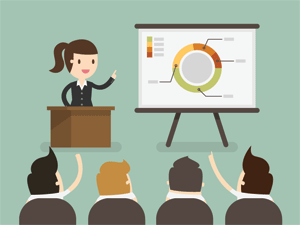Law firm efficiency starts by carving out time to train, speakers say

Image from Shutterstock.
Corrected: Just like the 12-step program, the first step in improving law firm efficiency is to admit that you have a problem. Otherwise no piece of legal technology in the world will help.
That was the main takeaway from a morning session at ABA Techshow on Friday. Britt Lorish of Affinity Consulting Group and attorney and co-author of E-Learning for Law Firms Peter Glowacki emphasized that law firms must become more efficient if they wish to remain relevant.
“Efficiency is key to competing in the marketplace these days,” said Lorish. “These days clients expect more from outside counsel. You can’t just do the same stuff you’ve done for 20 years.”
A good first step is to perform a skills assessment of everyone at the firm. Lorish suggested the Suffolk/Flaherty Legal Tech Audit, which was created by former Kia Motors in-house counsel Casey Flaherty and Suffolk University Law School’s Institute on Law Practice Technology and Innovation. The audit, which assesses a user’s ability to use Microsoft Word, Excel and Adobe Acrobat, is a good way to gauge the level of everyone’s expertise and figure out which employees need additional training.
“If people are lacking at their jobs, it’s up to you to build them up and help them improve as opposed to holding it over their heads and penalizing them,” said Lorish. (Flaherty and Andrew Perlman, who chairs the Suffolk institute, spoke during Saturday’s plenary session at ABA Techshow.)
Glowacki agreed, noting that training employees and getting them to improve sets them up to perform more sophisticated tasks down the line. “What if you take the very top of the group and push them to achieve even more?” Glowacki mused. “That raises everyone’s game. Corporations have been doing this for decades. Law firms? Not so much.”
Lorish pointed out that constant turnover is bad and very expensive and should be avoided, if possible. “Many people end up leaving due to lack of mentorship, support and professional development,” Lorish said.
“I always get attorneys saying ‘I don’t have time for training, but I also don’t have time to be inefficient,’” said Lorish. “Well, you have to carve out time to do it.”
It doesn’t have to be a lot of time, either. Lorish suggested “lunch-and-learns” where employees and attorneys learn one new software tip per one-hour session.
Glowacki, meanwhile, pointed out that everyone seems to have a smartphone these days. “You can always learn a few tips by using your mobile device during your morning commute,” said Glowacki.
Ultimately, firms need to have a strong foundation if they want to have any chance of becoming more efficient.
“It the underlying process is horrible, then all the tech in the world being slapped on top of it won’t fix anything,” said Lorish. “Your net gain will be a giant goose egg.”
Last updated at 6:15 p.m. Monday to correct a reference to Casey Flaherty, who is a former in-house counsel at Kia, not a former general counsel. The Journal regrets the error.
Correction
Last updated at 6:15 p.m. Monday to correct a reference to Casey Flaherty, who is a former in-house counsel at Kia, not a former general counsel. The Journal regrets the error.



